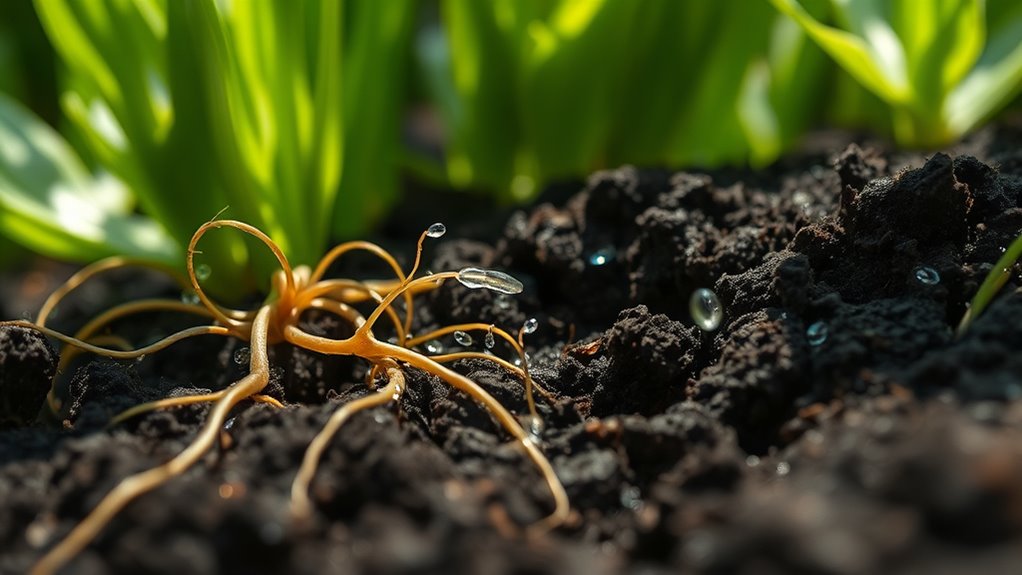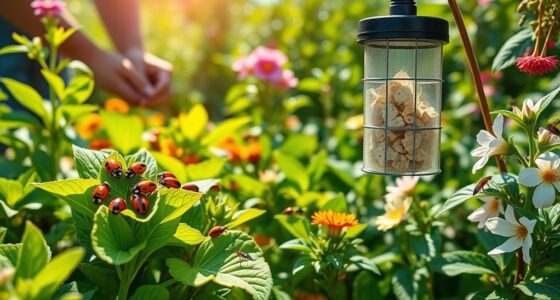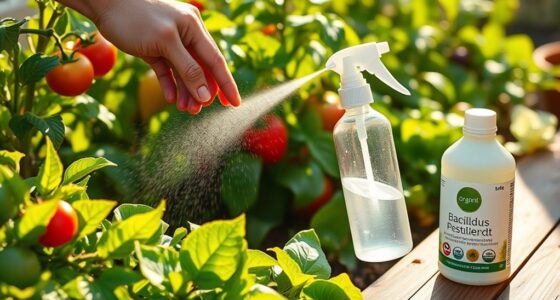Beneficial nematodes are your garden’s natural bodyguards, targeting soil-borne pests like grubs and root maggots without harming beneficial insects, pets, or humans. They hunt pests underground, releasing bacteria that kill pests quickly, helping you maintain a healthy, pest-free garden naturally. For best results, apply them to moist soil during early mornings or late evenings. Soon, you’ll see how these tiny allies support a thriving, balanced garden ecosystem—discover more to maximize their benefits.
Key Takeaways
- Beneficial nematodes naturally target soil pests like grubs and root maggots, promoting a pest-free garden without chemicals.
- They hunt pests underground, entering their bodies to release bacteria that quickly kill them.
- Apply nematodes in moist soil during early morning or evening for optimal effectiveness.
- Healthy, organic-rich soil enhances nematode survival, movement, and pest control efficiency.
- Using nematodes supports sustainable gardening by reducing chemical pesticide reliance and improving soil health.

Have you ever wondered how to naturally control garden pests without relying on chemicals? If so, beneficial nematodes might just become your new best friends. These tiny, soil-dwelling organisms are powerful allies in pest control, working beneath the surface where many pests hide and cause damage. By introducing beneficial nematodes into your garden, you’re not just fighting pests—you’re enhancing soil health, which is fundamental for vibrant, productive plants. They target specific soil-borne pests like grubs, mole crickets, and root maggots, helping you keep your garden healthy without harmful pesticides.
Beneficial nematodes naturally target soil pests, promoting healthy, pest-free gardens without chemicals.
When you use beneficial nematodes, you’re taking a natural approach that supports sustainable pest control. Unlike chemical solutions, these microscopic worms don’t harm beneficial insects, pets, or humans. Instead, they hunt down pests in their larval or juvenile stages, entering pests’ bodies and releasing bacteria that kill them quickly. This targeted method reduces pest populations effectively without disrupting the balance of your garden ecosystem. Plus, because they work underground, beneficial nematodes address pests that often go unnoticed until significant damage occurs, offering a proactive way to safeguard your plants.
Implementing beneficial nematodes is straightforward, but it does require understanding the importance of soil health. Healthy soil provides an ideal environment for nematodes to thrive and reproduce. When your soil is rich in organic matter and properly moist, nematodes can move freely and find their prey efficiently. If the soil is overly dry or compacted, their effectiveness diminishes. To maximize pest control benefits, you should apply nematodes during the right conditions—preferably when the soil is moist, and temperatures are moderate. You can usually find nematodes in a liquid suspension, which you mix with water and apply using a sprayer or watering can directly onto the soil surface. It’s best to do this in the early morning or late evening to prevent UV damage and ensure they stay active long enough to locate pests. Additionally, maintaining proper soil moisture is crucial for nematode survival and effectiveness.
Using beneficial nematodes also encourages healthier soil in the long run. As they feed on pest larvae, they help break down organic matter and promote a balanced soil ecosystem. This reduces reliance on chemical pesticides, which can degrade soil quality over time. By integrating beneficial nematodes into your pest control routine, you’re nurturing a more resilient garden that naturally suppresses pests while supporting soil vitality. Over time, you’ll notice fewer pest issues and healthier plants, all while maintaining an eco-friendly approach that respects your garden’s natural balance.
Frequently Asked Questions
Are Beneficial Nematodes Safe for Pets and Children?
You’re wondering if beneficial nematodes are safe for pets and children. Rest assured, they’re a safe option for pest control, offering pet safety and child protection. These microscopic worms target harmful insects without harming your family or wildlife. When used correctly, beneficial nematodes pose no risk to pets or children, making them a natural, eco-friendly choice to protect your garden and loved ones simultaneously.
How Long Do Beneficial Nematodes Typically Last in the Soil?
Did you know beneficial nematodes can last up to a year in soil? Their longevity varies due to environmental factors like moisture, temperature, and soil type. In ideal conditions, they stay active longer, providing ongoing pest control. However, extreme weather or dry soil can shorten their lifespan. To maximize their effectiveness, maintain soil moisture and avoid harsh chemicals, ensuring they remain active and beneficial for your garden longer.
Can Beneficial Nematodes Control All Types of Garden Pests?
Beneficial nematodes can’t control all garden pests because of pest specificity and nematode diversity. Different nematode species target specific pests, so you need to choose the right type for your problem. While some nematodes excel at controlling soil-dwelling pests like grubs, others may not be effective against pests outside their scope. To get the best results, identify your pests and select the appropriate nematode variety accordingly.
What Environmental Conditions Are Best for Applying Nematodes?
You should apply beneficial nematodes when soil moisture is high, ideally after watering or rainfall, to help them move through the soil. The best temperature range is between 55°F and 80°F, as extremes can reduce their effectiveness. Avoid applying nematodes during the heat of the day or when the soil is dry. Consistent moisture and moderate temperatures create ideal conditions for nematodes to thrive and target pests effectively.
Do Beneficial Nematodes Require Reapplication Each Season?
Did you know beneficial nematodes can be effective for up to six weeks? Reapplication frequency depends on your garden’s conditions, but generally, nematodes need reapplication each season to maintain their pest-fighting power. Seasonal effectiveness can vary due to factors like soil moisture and temperature, so reapplying guarantees your garden remains protected from pests throughout the year. Regular treatments keep your garden healthy and pest-free.
Conclusion
Think of beneficial nematodes as your garden’s hidden warriors, silently patrolling the soil like tiny knights on a mission. With each invasion they thwart, your plants breathe easier, flourishing under their watchful eyes. These microscopic guardians turn your garden into a lush fortress, defending against pests with quiet determination. Embrace these natural bodyguards, and watch your garden bloom brighter, healthier, and more resilient—an enchanted kingdom protected by nature’s smallest, mightiest defenders.









